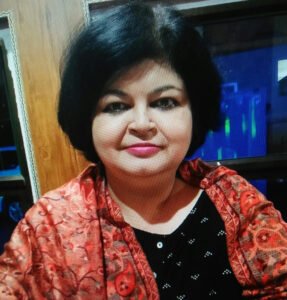Evening, April
Evening, April
Indrani Rai Medhi
Another April evening. High above, the clouds, the colour of soot, as if they had been born of the smoke from the trains that rattled past the length of the city, piled up in the fading light and glowered down upon the hoardings, the buildings lit up for the night, the streets teeming with cars, buses, autos and trekkers. They hung heavy over the park benches where lovers murmured and groped, over the rippling waters of a tank dug by a long dead king, the markets of shouting vendors and people endlessly filling up the holes in their lives. Few heard the distant rumble of thunder as countless engines roared. Then the wind sprang up, a little gust here, a rustling there. Eddies of dust circled in the air. The fine sand whirled up from the river’s vast banks in little agitated bursts as the grey mass of clouds shifted with quiet menace and jagged streaks of lightning.
It was at this moment that a small, fierce curse slipped out of Anju’s lips. Something to do with mothers. It was only six o’clock and the fresh kettle of tea simmering on her stove on the rickety table jammed against the wall of the office, right on the pavement, was still full. There was still a big ball of dough covered with a red-checked cloth. On the aluminium saucepan was the chickpea gravy she had cooked in the morning. If the rains came now, the tea, the dough, the chickpeas would all be wasted and she would take home only Rs. 45 wrapped in the knot at the end of her grease-spotted chador. The flame on the stove sputtered as the gust played with it and she cursed again. Her eyes were dark with anger and her jaw set hard, so that she looked older than her thirty years. Even her breasts seemed angry, for beneath the faded fabric of her blouse they were hard and unyielding, like pomegranates. All day long it was this anger that made her cling to this space in the pavement, for 12 years, lighting the stove, boiling the tea, rolling out rotis, feeding men who took a break from driving their rickshaws, laying bricks, mending pipes, painting walls, to stand around her, wolfing down her food, drinking her tea, holding the plates and glasses with calloused, work worn hands with dirty fingernails, unshaven men in crumpled clothes, glancing furtively at her hard, proud breasts and raising their glasses for the last drop. She was swift with her hands, serving several customers at once, and able to total up the sums they owed her in an instant. Many of them had been coming to her for years and she knew their names, where they lived, their small defeats and victories. Some flirted with her, laughing as she lashed out with an obscene retort. It made her angry that they did not desire her in the way she had always longed to be desired and she was filled with scorn at their slovenly ways, their patched clothes and paan-stained teeth. But no, she did not allow herself to remember him.
“Your father is dead,” she had said years ago, oiling Deepa’s hair. “No. I have no pictures. He was a good man. Sit still, girl, it’s not done yet.”
She had said the same thing to the owners of the many hovels she had rented over the years, to the men who were curious about her, the paan shop owner who sometimes helped her with loose change. She told this to the constable Haren who ate free at her shop while on duty and warned that the municipality would soon clear the pavements. She also told this to the headmistress of Deepa’s school on her admission day. A dead husband was sometimes useful, even necessary.
A man ordered a cup of tea, fumbling for coins in his trouser pocket. She rinsed a glass, picked up the kettle and poured. The wind was now a little more fierce and people moved at a hurried pace. Three men came up. They wanted rotis and sabji. Quickly. She rolled out the dough, baked the rotis on the girdle, warmed the sabji, handed out the plates, watching them wolf down the food.
He had never eaten like that.
When the first drops of rain fell, she put out the stove, brought out a length of tarpaulin from under the table and tied it from two poles to shelter her and the utensils. The pavement emptied as the shower came upon them, round, wet coins on the pavement and the road. Cars picked up speed and people scrambled into buses.
She would wait it out for a while. Bolen, the rickshawallah who lived near her in Krishna Nagar, often stopped at night here, helping her load her utensils in the rickshaw and ride home. She paid him whenever she could. But it was still an hour to go before he came. Her bleak eyes looked out into the night and the rain and thought. I wonder where he is. So many years had gone by.
On the other side of the city, below the Temple of the Nine Planets, in an old decrepit house had lived a family she had been brought to work for, 15 years ago. A family of three brothers, their wives and children, a blind old woman and an angry old man. Anju. “Where is the shirt, Anju? Are the vegetables ready, Anju? Why don’t you answer when you are called? Anju, answer the door.” That was where she had learnt to be swift with her hands – ironing, peeling, kneading, shelling, swabbing, cutting, pouring. Her name being called from different rooms, as if in an endless series of echoes throughout the day. She could not say it was a harsh life. Two sets of clothes a year. Wages sent to her only living relative, an aunt, in the village.
Then, one summer day, came the fourth brother, with a suitcase, a box of books. He had lived away, in some far-off city – a slender young man, with hair that curled to the nape of his neck, and eyes that looked out without hope. From the first day, he remained shut up in his room, reading, smoking and at night went out, returning every midnight in a towering, drunken rage, hammering on the door, laughing, weeping, vomiting on the carpet. It was left to her to wait for him every night, to open the door, to warm his food, set the table alone, as the family remained shut up in their rooms. He would talk to her in English, grinning at her and bowing before her with an exaggerated flourish. She was never afraid of him, not even when he broke things in his rage, because he always took the trouble of saying sorry to her in English, before falling into a deep stupor in the sitting room sofa, as even on the carpet. It was on a night like this – wild, dark, wet and windy that he had come home, his clothes soaked through, his hair plastered. She had handed him a towel and dry clothes, hurrying to set the table. He left his food uneaten on the table, slumped on the sofa watching TV with the sound turned down. She had gone to call him, tired, sleepy and weary of this midnight chore.
It was then that the current had gone off. They collided against each other on the doorway. She felt her face against his chest, his lips on her hair, his hands tight on her shoulders. There was no need for him to clamp his hand over her mouth. She gave herself gladly, generously, not knowing the ways of loving, but flowing like a river, knowing no bounds or urgency.
Weeks later, his suitcase was by the front door. Because he was not drunk and it was only morning, he did not speak to her in English. His eyes gazed at her for a moment, and then he turned away. Weeks later, when she grew clumsy at her chores and was sick all over the hallway sink, the women of the house shrilled that she had blackened her face with many men and they were a respectable family and she was to go away at once. Deepa was born to her at a women’s shelter home that winter. After odd jobs here and there, she had set up this hotel, as she called it, on the pavement. Standing all day in the sun, her skin had turned into a leathery tan. Her long hair was frizzy, a thin angry bun at the nape of her bare neck. The creases on her forehead spoke of sadness, worry, struggle, heartbreak.
The rain suddenly petered out. She lighted the stove again. The tea began to bubble. Life would go on. Next year, Deepa would appear for her school finals. She had his curly hair, and the ability to sit still for a long time.
A boy stood uncertainly on the pavement, perhaps waiting for a bus. His T-shirt was soaking wet. “Here,” she held out a glass. “You will catch a cold. Have some tea.”
He smiled, surprised. He took it from her hands and said, in English. “Thank you.”
Nobody had spoken like that to her for a long time.

Indrani Rai Medhi is a journalist, columñist and author. She has won the Kunjabala Devi award for investigative award for women issues and the Yamin Hazarika award for excellence. She has authored 12 books.




